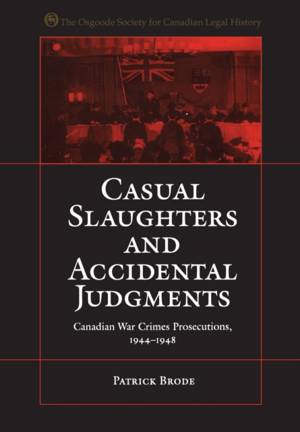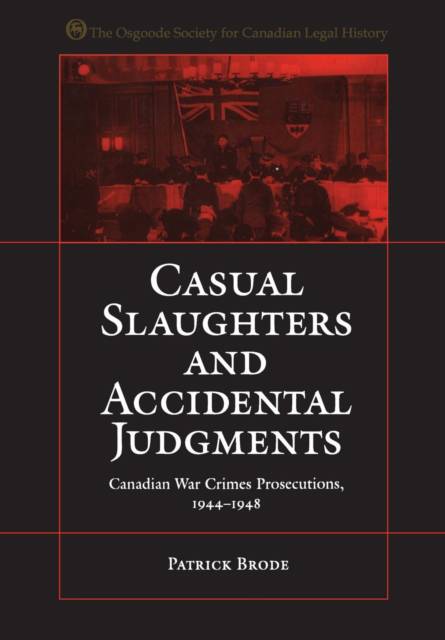
- Afhalen na 1 uur in een winkel met voorraad
- Gratis thuislevering in België vanaf € 30
- Ruim aanbod met 7 miljoen producten
- Afhalen na 1 uur in een winkel met voorraad
- Gratis thuislevering in België vanaf € 30
- Ruim aanbod met 7 miljoen producten
Casual Slaughters and Accidental Judgments
Canadian War Crimes Prosecutions, 1944-1948
Patrick BrodeOmschrijving
War crimes prosecutions create unique difficulties as civilian standards of law are applied to the extraordinary circumstances of war. Governments are often surprisingly hesitant to pursue war criminals. Patrick Brode has produced a fascinating study of such issues in Casual Slaughters and Accidental Judgements, a history of Canada's prosecution of war crimes committed during the Second World War. It is a history that includes personalities such as Lt. Col. Bruce Macdonald, whose persistence overcame Ottawa's reluctance to pursue the 'war crimes business, ' and SS Brigadeführer Kurt Meyer, whose last-minute reprieve from death by firing squad followed a trial reminiscent of a Hollywood melodrama. Brode illustrates the difficulties of applying law to a recently defeated enemy when the emotions and politics of war distort any sense of impartial justice. The trials also reveal much about the legal and diplomatic views that prevailed at the end of the war and democratic Canada's willingness to overcome its colonial past to defend its own interests on the international stage.
The objectivity of the trials is still subject to question and they have been condemned by some as retaliatory. Brode clearly shows that Canada's war crimes trials of 1945 to 1948 were a part of a movement to apply humane standards of conduct to warfare. Recent events in places such as Vietnam, Bosnia, and Somalia show how pertinent these concerns remain.
(The Osgoode Society for Canadian Legal History)
Specificaties
Betrokkenen
- Auteur(s):
- Uitgeverij:
Inhoud
- Aantal bladzijden:
- 322
- Taal:
- Engels
- Reeks:
Eigenschappen
- Productcode (EAN):
- 9781442652330
- Verschijningsdatum:
- 15/12/1997
- Uitvoering:
- Paperback
- Formaat:
- Trade paperback (VS)
- Afmetingen:
- 170 mm x 244 mm
- Gewicht:
- 517 g

Alleen bij Standaard Boekhandel
Beoordelingen
We publiceren alleen reviews die voldoen aan de voorwaarden voor reviews. Bekijk onze voorwaarden voor reviews.









